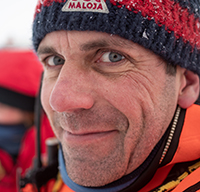Geosciences Working Group
Ein Jahr im arktischen Eis â Bericht und erste Ergebnisse der MOSAiC-Expedition
Organiser: Prof. Dr. Jens Lehmann
Location: MARUM I, room 0180Start Time: 10/13/2022 19:20
Category: Geosciences Working Group

lecturer: Dr. Gunnar Spreen
Dr. Gunnar Spreen is head of the working group "Remote Sensing of the Polar Regions" at the Institute for Environmental Physics at the University of Bremen. He has been involved in satellite observations of sea ice in the Arctic and Antarctic for more than 15 years. Gunnar Spreen studied physics in Hamburg and Bremen. During his diploma thesis he became interested in the polar regions and satellite remote sensing. He continued to work on this topic during his doctoral thesis in oceanography at the University of Hamburg. This was followed by research stays at the NASA Jet Propulsion Laboratory in Pasadena, California, USA (until 2012) and at the Norwegian Polar Institute in TromsÃļ (until 2015).
For the MOSAiC expedition, Gunnar Spreen is responsible for the coordination of the remote sensing activities as a member of the Project Board. For a total of 5 months he was on board the research icebreaker Polarstern to improve satellite observations from space using instruments on the ice floe.
From October 2019 to September 2020, the research icebreaker Polarstern drifted with the sea ice from the Russian Arctic to the Fram Strait between Greenland and Spitsbergen for one year. The international MOSAiC expedition, led by the Alfred Wegener Institute, aims to better understand the Arctic climate system and improve climate models. To achieve this, a strongly interdisciplinary measurement program covering atmosphere, ocean, sea ice, biology and bio-geochemistry is of great importance. This talk will focus on sea ice and satellite remote sensing.
For more than 40 years, satellite measurements have shown the drastic decrease in Arctic sea ice. The temperature increase in the Arctic is more than twice the global average. This phenomenon, known as "Arctic amplification," is one of the strongest signals of global climate change currently observed.
Dr. Gunnar Spreen from the University of Bremen was on board Polarstern during the first and last of the five cruise legs and will report on impressions and initial research results.
to webpage
back

